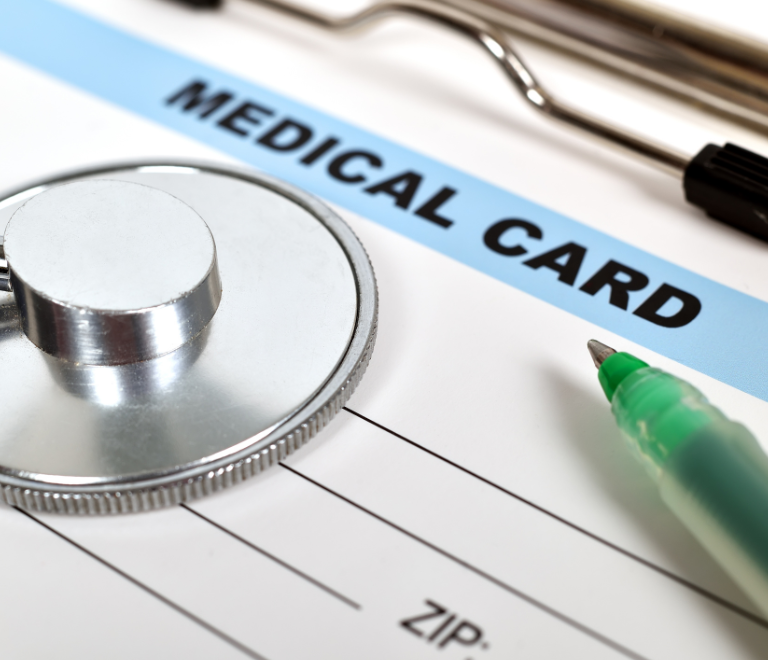Medical disorders that can significantly affect a person’s ability to drive safely include high blood pressure, heart attacks, hearing impairment, seizures, eyesight loss, and others. Because of this, to prove they are well enough to drive, drivers must either pass the DOT medical examination or be exempt from it, and they must also possess an authorized medical certificate (or card), issued by the Federal Motor Carrier Safety Administration (FMCSA) or the United States Department of Transportation (DOT).
If you live with a stable health condition and don’t think you can pass the DOT exam, you might be eligible for an exemption.
What Is A DOT Medical Card?
A DOT medical certification serves as proof that the commercial driver is able to perform their role as a truck driver and has demonstrated the appropriate mental, emotional, and physical fitness required.
You must do your DOT physical examination with a licensed medical examiner who has been approved by the Federal Motor Carrier Safety Administration (FMCSA), according to the standard requirements for DOT medical cards. Among the qualified medical examiners are the following:
- Advanced Practice Nurses (APN)
- Doctors Of Chiropractic (DC)
- Doctors Of Medicine (DM)
- Doctors Of Osteopathy (DO)
- Physician Assistants (PA)
The medical professional will search for indications of any underlying medical issues that can impair your ability to drive safely during the assessment. The supplier will:
- Ask about your medical history, keeping a record of any procedures you may have had, the kinds of drugs you use, and any conditions you may be facing. There will also be inquiries into drug test failures and issues related to substance abuse.
- Talk about any symptoms you’re experiencing right now.
- Examine your blood pressure, eyesight, height, weight, chest, lungs, back, spine, and other body components during a hands-on medical examination. A closer look at your neural and circulatory systems, including your veins, arteries, lymphatic system, and reflexes, is part of this physical examination.
- For a urinalysis, request a sample of urine. A urinalysis looks for diseases like diabetes or prediabetes.
- Find out if you snore. If so, they can ask to have you undergo a test for sleep apnea.
The majority of people get this test every 24 months in order to promote good health and, in the case that their health is declining, to take preventative measures. It is critical for your health and safety, as well as the safety of other road users, to keep yourself in excellent health when operating a commercial vehicle.

Medical Conditions Exemptions from the DOT
To operate a business vehicle, you must obtain an exemption under specific circumstances. You might require DOT tests more frequently than every 24 months if you have certain problems.
Diabetes
With diabetes, you can obtain and maintain a commercial driver’s license, but you’ll need to provide proof that your condition is under control. If they can demonstrate that their disease is managed with (or without) insulin, people with type 1 and type 2 diabetes may be eligible for an exemption.
A number of paperwork and a substantial amount of supporting evidence are required to demonstrate that your ailment won’t impair your driving skills. Among the prerequisites you’ll need to fulfill are:
- having taken insulin for at least 30 to 60 days
- without having gone through a period of acute hypoglycemia in the preceding 12 months
- not having experienced many severe hypoglycemia episodes in the previous five years
- recording of the most recent diabetes education
- a finished application accompanied by endorsement from an endocrinologist
- operating an interstate vehicle
- not operating a vehicle for federal, state, county, or local employment
It’s critical that you demonstrate that you understand how to monitor and manage your condition and that you have consistent control over your blood sugar levels.
In addition to these prerequisites, you will also need to demonstrate that diabetes has not adversely affected your eyes and that you can see more than 70 degrees in each eye. Your diabetic retinopathy and any associated problems ought to be stable. You should also have at least 20/40 visual acuity in each eye.
Hearing Impairment
You can steer clear of potentially dangerous situations when driving by having an aural sense of your surroundings. You will be required to take a hearing test as part of your DOT physical examination.
If you are wearing hearing aids, you will be allowed to use them during the “forced whisper” test.
The medical examiner will say a two-syllable word about five feet away from you throughout this test and will ask you to say it again. If you fail to do this, you will be asked to pass an audiometer exam.
Vision-Related Conditions
There are numerous illnesses that might harm your vision. Therefore, having clear eyesight is essential when driving because poor vision can slow down your reaction times and increase the risk of an accident.
You must have a 70-degree field of vision and 20/40 vision in each eye to pass the basic DOT examination. The ability to distinguish between red and green traffic lights as well as other traffic control colors is also crucial.
If you are unable to pass the normal DOT examination, you may be eligible for a visual exemption. Every exemption has a two-year maximum validity period.
These are the requirements you should meet:
- a current license that certifies you have kept your license active in your state of residence for three years or more
- worked with commercial motor vehicles for at least three years (the experience should have started as soon as you filed your exemption application)
- at least ten hours a week of driving
- a history of safe driving
- a visual impairment that has persisted for three years or longer
- a greater, steady vision and meeting FMCSA vision criteria in the eye
Seizures
If a person with a seizure disorder fails the DOT exam, they can still be eligible to keep their commercial driver’s license. That said, it will be challenging and require time. Proof that you have not had a seizure for at least eight years—with or without medication—is required by the FMCSA. You will need to remain medication-free and seizure-free for eight years after that date if you change treatments. In addition, you should stick to the same drug schedule for a minimum of two years—that is, you shouldn’t alter the dosage, frequency, or medication itself during that time.
Exemptions in the Trucking Industry for Various Roles
Your CDL may be reduced to a normal license if you don’t pass the DOT exam, which will restrict your ability to operate big trucks. But, there are lots of other paths you can take to continue working in the trucking sector, as well as other positions that might be more appropriate for you.
Among these opportunities are the following, to name just a few:
- Administrator
- Dispatcher
- Freight broker
- Marketing Manager
- Safety manager
- Salesperson
We hope this blog helps! If you want to learn more about DOT and the trucking industry, you may check our free resources.
You may also call us at (317) 978 0276 to learn more about the opportunities we offer for owner-operators.
Thank you!



